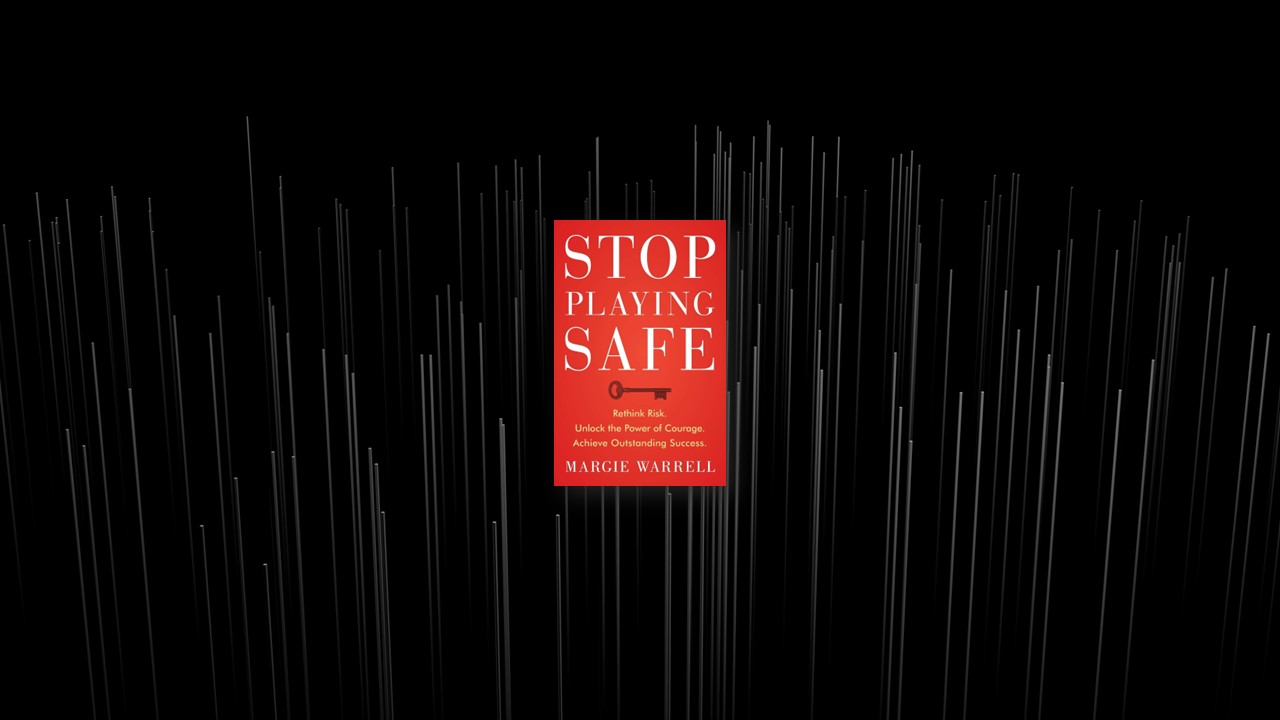BEWARE OF NORMALISING FEAR; NOT ALL RISKS ARE TO BE AVOIDED
Let’s face it, every day you’re bombarded with reasons to feel afraid. Fear of random violence, recession, terrorism, child predators, online predators, identity theft, AI, outsourcing jobs to low-wage countries … the list is long and new threats seem to sprout like poisonous mushrooms.
Marketers prey on fears. Media prey on fears. Politicians play to fears.
Fear sells products. Fear gets clicks. Fear makes profit. Fear grows power.
And fear fuels fear.
TRUST YOURSELF, NOT YOUR FEARS
Fear limits our lives more than any external obstacle ever can. If you’re wondering where it might be limiting yours, take a moment to answer these questions.
- Do you avoid uncertainty wherever you can?
- Does concern that you’ll be ‘found out’ as unworthy keep you from putting yourself out there in bigger ways?
- Do you spend more time conjuring up worst-case scenarios about what could go wrong than you do about what you’d like to make more right?
No-one relishes the prospect of being rejected, or having their intelligence questioned. No-one enjoys giving candid feedback they know will be confronting. No-one likes making decisions that don’t turn out optimal. But unless you’re willing to risk ‘all the above’, you’ll never create a life that lights you up or discover how little reason you ever had to feel afraid to begin with.
It’s a simple rule of life — you have to be willing to risk the safety of where you are now in order to create the possibilities you want most.
LEARN TO MANAGE YOUR FEAR OR IT WILL MANAGE YOU
It is part of the human condition to sometimes succumb to fear even when we intellectually know we should rise above it. But the fact that fear sometimes holds the reins in your life is far less important than what you do once you realise you’ve just let fear win. In that moment, taking a step back from your situation to reframe the risks, reassess the costs of not taking one and recommit to walking the braver path will change the trajectory of your future. It will not banish your fear, nor make you immune to it. But each time you decide to act in its presence, you weaken its power and strengthen your own.
Cultural anthropologist Ernest Becker wrote that people’s fears are fashioned out of the ways in which they perceive the world around them. What you think you fear is rarely what you really fear. Rather, it’s what you link to fear. It’s the associations you make in your mind about what might happen that cause you to feel afraid. And what you think might happen is always based on some past event. So as you think about whether to take an action or not, drill down and ask yourself, what am I really afraid of here?
Then take a moment to acknowledge that your fear is trying to spare you from experiencing an emotion that you think will be painful. But again, what pain do you put yourself in if you stay where you are?
KNOW WHAT TO FEAR
Making choices requires wrestling with trade-offs between the pros and cons of one course of action (which is often doing nothing) against another. Too often, though, when we compare our list of pros against cons for each option, we make invalid comparisons based on the false assumption that the present situation will remain the same. As President Kennedy once said, ‘There are risks and costs to a program of action. But they are far less than the long-range risks and costs of comfortable inaction.’
In an effort to take the safest path possible, many people end up living a life they would never consciously have chosen. Just look around you at people who have avoided risk all their lives and observe the shape of their lives.
So to help you in deciding whether you should take a risk, work through each of the four quadrants in Reward Matrix.

Remember, we often tend to put a disproportionate amount of energy onto the costs of taking a risk and discount the costs we pay for not taking the risk — this will help you avoid that innate bias.
Courage is far less about heroism on the battlefield or in the midst of a natural disaster and far more about the everyday choices you make as you navigate your way through life. It’s not the absence of fear (or doubt or misgivings) about your ability to succeed. It’s action in the presence of fear. In the words of John Wayne, ‘Courage is being scared to death but saddling up anyway’.
Sure, when you take a risk, you might sacrifice comfort, time or money. However, that pales against what you sacrifice when you play too safe — discovering what works, what doesn’t and what you’re truly capable of doing. When you stick with the status quo you cut off the possibility of learning, of growing, of creating, of winning and of experiencing the aliveness that comes from bravely stepping from the stands into the arena of life.
Neuroscientists have found that cells that fire together, wire together. The more often you engage in activities that are courageous, the more adept you’ll become at them. You don’t have to start with the most nail-biting act of courage. Sure, think big and aim high. But right now, focus on the choices right in front of you. Fear is contagious, but so too is courage. It’s like a muscle. The more often you choose to do the brave thing, the braver you become.
MAKE DAILY STROKES OF EFFORT
As you move forward in building momentum, be mindful that sometimes you may need to take a rest from your risk-taking, restock your reserves and reassess — which direction do you want to take next time you head out of your comfort zone? Don’t make yourself wrong when you make a choice to play safe. Sometimes that’s the best choice for you at that moment, given everything else going on in your life. Whatever choices you make or actions you take, just own them — along with the benefits and costs of making them.
William James, the father of modern psychology, prescribed that people make ‘daily strokes of effort’ towards their goals so they become more comfortable with the discomfort of stepping outside their comfort zone.
Breaking down your big goals and aspirations into more doable short-term goals and specific action tasks sets you up for success, when it comes to staying in action daily. These things may include more mundane actions — such as signing up for a course or brushing off your CV — but challenge yourself to do at least one thing daily that pushes you out of your comfort zone. It could be making a phone call you’ve been putting off; setting up a meeting with your boss to discuss promotion opportunities, or with a client prospect to pitch for new business; addressing a long-standing issue with someone; volunteering to lead a project team; attending a networking event; or introducing yourself to someone in your industry who can help your career.
The more you act with courage, the more courageous you’ll become. Life rewards action. Always has. Always will.


